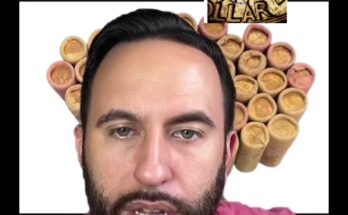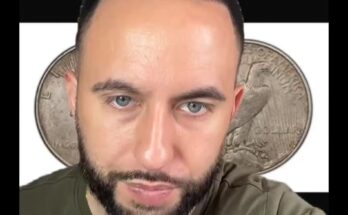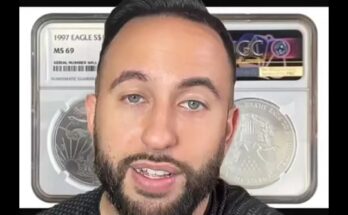
we don’t just look at coins—we decode potential treasure. That ordinary-looking 1990-D Washington Quarter might be more than just spare change. In fact, some collectors believe a rare combination of minting mistakes could make one of these coins worth up to $1,500,000.
Yes, seriously. Let’s break it down.
🧩 The “Million-Dollar Combo” of Mint Errors
Most 1990-D quarters are worth just 25 cents—but one with a specific trio of mint errors can soar into the six- or seven-figure range.
Here are the three errors you need to look for:
1. 🔁 Doubled Die Mint Mark (“D” Doubling)
- Where to Look: Obverse (front), beneath “IN GOD WE TRUST”
- What to See: A clearly doubled “D” mint mark—not flat or shelf-like (which would be machine doubling)
- Why It Matters: A true doubled die on a mint mark is incredibly rare and highly collectible.
2. 🦅 “DD Wing” Die Clash
- Where to Look: Reverse (back), near the eagle’s wings and surrounding areas
- What to See: Faint, ghost-like impressions of obverse elements (like Washington’s face or lettering)
- Why It Matters: A dramatic die clash adds rarity, especially when combined with other errors.
3. 🗣️ “Spitting Eagle” Die Chip
- Where to Look: The eagle’s beak
- What to See: A small raised line or lump coming out of the eagle’s mouth
- Why It Matters: Visually striking errors like this are fan favorites—and prices can rise fast when paired with other rare traits.
⚠️ Real Error or Common Damage?
Understanding the difference between valuable errors and ordinary damage is crucial.
| Type | Valuable? | Details |
|---|---|---|
| Doubled Die | ✅ Yes | Clear doubling from hub misalignment—not machine doubling |
| Die Clash | ✅ Yes | Ghostly details transferred from the opposite die |
| Die Chip/Crack | ✅ Yes | Raised lumps or lines from die damage |
| Machine Doubling | ❌ No | Flat, shelf-like—not a true mint error |
| Post-Mint Damage | ❌ No | Wear, scratches, and other circulation damage |
🧠 What You Need to Verify It
To examine your coin properly, you’ll need:
- 🔍 10x–20x Loupe or a USB microscope
- 💡 Strong angled lighting to catch faint details
- 🖼️ Side-by-side comparisons with verified error coins (try PCGS CoinFacts or NGC VarietyPlus)
📈 How Coin Condition Impacts Value
The grade of your coin has a major effect on market value:
| Grade | Condition | Collector Interest |
|---|---|---|
| Circulated | Visible wear | Still valuable due to rarity |
| AU-50 | Light wear, some luster | Sought after |
| MS-63 | Minor marks, uncirculated | Strong collector demand |
| MS-65+ | Almost flawless | High premiums |
| MS-67+ | Gem quality | 💰 Auction-level prices possible |
🛡️ How to Authenticate and Sell It
✅ Step 1: Do NOT Clean the Coin
Cleaning destroys originality and reduces value. Leave it untouched.
✅ Step 2: Submit to Professional Grading
Use only top-tier third-party graders:
They will:
- Confirm the errors
- Assign a grade
- Seal it in a tamper-proof slab
✅ Step 3: Sell Through a Premier Auction House
For coins this rare, use respected platforms with large buyer networks:
📸 Submitting Coin Photos? Here’s How:
- Zoom in on the mint mark and eagle
- Use natural lighting
- Take multiple angles
- Keep your hands steady or use a phone stand
🚨 Common Pitfalls to Avoid
❌ Mistaking machine doubling for a real error
❌ Assuming post-mint damage adds value
⚠️ Falling for counterfeits—always verify
If your quarter matches these error traits, submit it immediately for authentication.
📊 Market Outlook (2024–2025)
✅ Demand for multi-error coins is at an all-time high
✅ Visual errors (like “Spitting Eagle”) are surging in popularity
✅ Online forums and collectors are more active than ever
✅ Authentication is more important than ever for serious value
🎁 BONUS: Free U.S. Quarter Error Checklist!
Want to become a smarter collector?
Get our exclusive checklist featuring:
- 🔍 Top 10 quarter errors
- 🛠️ Tools you can use at home
- 📬 Instant email delivery
👉 Subscribe now to the PennyVerse Newsletter and get your free copy today!
🧠 Have a Coin to Review?
Let our team of experts take a look. Submit your coin photos and description for a free evaluation—we’ll help you determine if you’re holding a hidden gem.



Leave a Reply